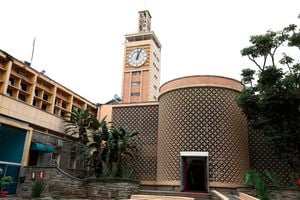Tracing the social tap root of ethnic politics

Firefighters extinguish a fire at a medical facility, the site of a missile strike, in the city of Dnipro on May 26, 2023, amid the Russian invasion of Ukraine. The current Russia-Ukraine crisis has elements of ethnic politics.
This is the first of a two-part series on politics and ethnicity in Kenya. This article will explore the causes of ethnic politics and the second will explore possible solutions. No one makes an application on where he or she should be born.
We all find ourselves born as Kikuyus, Somalis, Taitas, Luos, Kalenjin, Kisii, Meru, Mijikenda and so forth. It is unfair and morally repugnant for the accident of place of birth to define our political fate. Our most important religions preach ethnic equality and tolerance.
The bible, in Colossians 3 :11, states, “Here there is not Greek and Jew, circumcised and uncircumcised, barbarian, Scythian, slave, free; but Christ is all, and in all.” Romans 2:9 states: “There will be tribulation and distress for every human being who does evil, the Jew first and also the Greek, but glory and honour and peace for everyone who does good, the Jew first and also the Greek. For God shows no partiality.”
The performance of the economy affects every Kenyan equally irrespective of one’s ethnicity. Ordinarily, Kenyans associate themselves beyond ethnicity. An Indian shopkeeper sells merchandise to everyone.
When teachers or doctors go on strike for better pay, they will do so along economic interests and ethnicity will not play any role. A Kikuyu shopkeeper will be found deep in Luhyaland peacefully going about his business and completely detached from his Central Kenya roots.
Why is it that, when it comes to politics, Kenyans retreat into ethnic cocoons? Why is it that the best predictor of a presidential election outcome is ethnicity? Why can’t Kenyans vote on class or economic lines? Kenya’s elections have been described as nothing but a mere ethnic census. One needs to look at an electoral register, count the ethnic numbers and predict the outcome of a presidential election.
These are complex questions that need complex answers. This article does not seek to offer a panacea to the vexing matter. It only makes a feeble attempt.
Forging a united nation with shared social and economic aspirations must remain an important societal goal. Otherwise, our politics will remain unstable, always resulting in cyclic ethnic-inspired chaos that causes bloodshed and loss of property.
Many innocent women and children suffer as a result of ethnic violence that arises whenever politics becomes unstable. Every Kenyan life matters, hence this discourse.
Some have argued that Kenyan politics is ethnic because ours is a developing country. They argue that this problem will persist only for a while and once Kenya develops, the issue will be solved. This argument is not necessarily true. Whereas it is true that many underdeveloped countries such as Kenya, Somalia, Congo and Sudan have serious problems with ethnic politics, there are many so-called sophisticated countries grappling with the same.
In the UK, Northern Ireland politics is basically tribal, with many Anglicans viewing themselves as more British and Catholics identifying themselves more with Ireland. This division led to prolonged bouts of violence during the historical phase called “the Troubles”.
Linguistic divide
Belgium, a small country in Western Europe, has grappled with problems arising from the linguistic divide between the Flemish and Walloons throughout its history. The Flemish speak Dutch, while the Walloons speak French. This linguistic divide has caused political instability, economic disparities and social tensions.
The Flemish region is more prosperous than the Walloon region, with higher levels of employment and a stronger economy. This has left the Walloons feeling left behind.
The current Russia-Ukraine crisis has elements of ethnic politics.
Eastern Ukraine has a huge Russian-speaking population that largely leaned towards Russia. The western part leaned towards the West. That ethnic divide partly created perfect conditions for the current war.
In Asia, countries with a huge Chinese population like Malaysia, Indonesia and Thailand grapple with the ‘Chinese question’ in politics.
The point is, ethnic politics is universal and not unique to Kenyan society.
Several theories seek to explain the causes of ethnic conflict in politics. We shall highlight the mainstream three.
Primordialists argue that ethnic groups exist courtesy of traditions of beliefs that inspire action towards primordial objects such as biological features or geographical locations. Strong kinship ties give family resemblance. These ties loosen civil connections in times of competition, particularly during elections. Hence a Kikuyu commoner will find a Kikuyu presidential candidate more appealing as he or she is ‘family’. Therefore, ethnic conflict in politics is almost a certain and permanent phenomenon as primordial ties are “natural”.
This theory has merits in the sense that it explains the recurring and almost permanent nature of ethnic politics. But it fails to explain, for instance, Kikuyus’ decision to vote for a Kalenjin when it had always been assumed Mt Kenya would never vote for someone from outside their region. Or how did Luos vote for Kikuyus in 2002?
The instrumentalist theory argues that ethnic politics is a mere instrument of the elite, who find it an easier political organising principle than other forms of mobilisation, like class consciousness.
This theory is based on the notion that politicians are rational, self-interested actors who use ethnicity simply as the easiest route to power. Whereas the theory explains the role of the political elite in ethnic politics, it fails to explain why people accept to be manipulated.
Are the masses so gullible as to be cheated by politicians to vote tribally against their objective interests?
Finally, the constructivists argue that ethnicity is a socially constructed phenomenon that arises due to several factors, including technology and history. For example, it is widely believed that the Tutsi and Hutu ethnic identities in Rwanda were created artificially by Belgium in the 1950s.
Luhya is also an artificially created identity comprising different and separate tribes. Technology, whereas it can — on the face of it — appear as a force for the construction of a civil and non-tribal association, often creates stronger ethnic bonds. For example, FM stations technology fostered greater Kikuyu nationalism in the 1990s with the emergence of vernacular stations.
Next week this column will attempt to explore possible solutions to negative ethnicity.
Dr Kang’ata is the Governor of Murang’a County.





